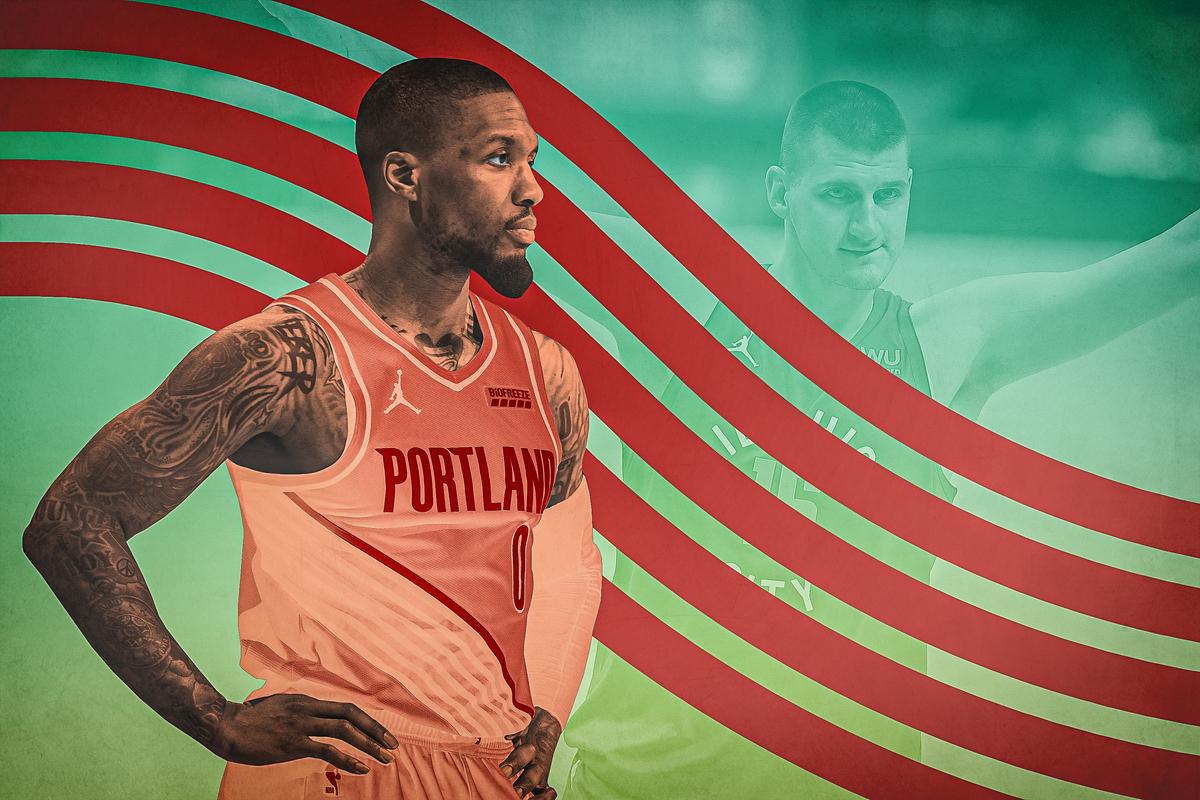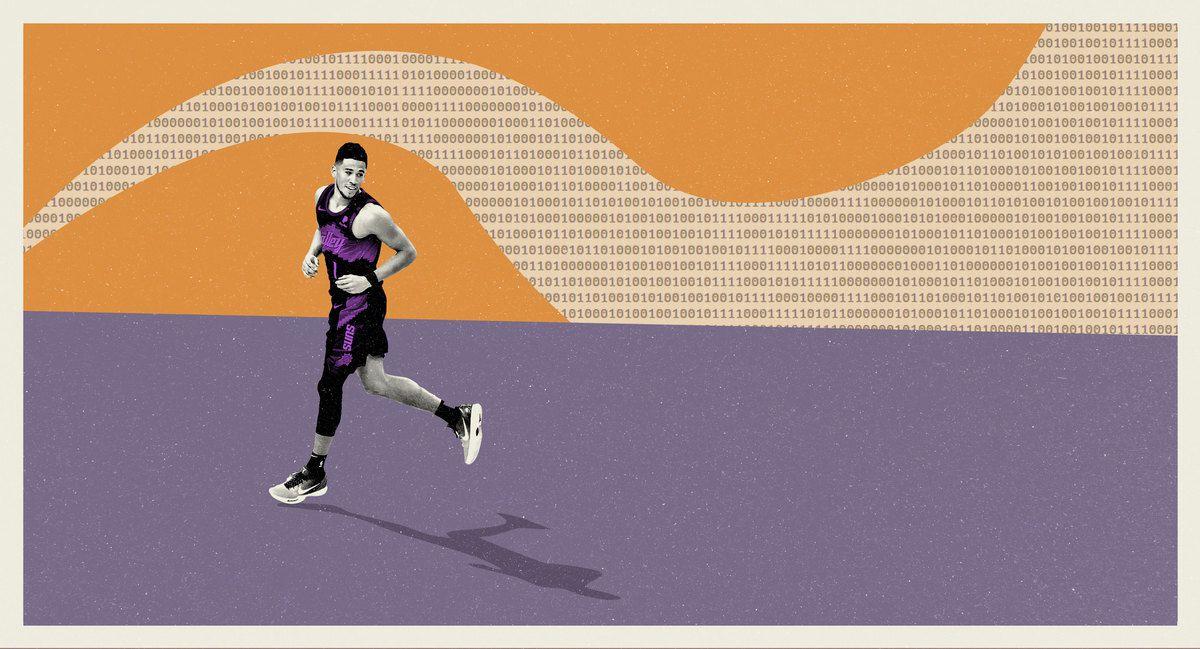
When the final buzzer sounded at the end of double overtime in Game 5, Damian Lillard’s team had fewer points than Nikola Jokic’s team. Because of that—because the NBA postseason is a zero-sum game, because the wounded but still awfully good Nuggets are now one win away from the second round, and because the incendiary but perhaps fatally flawed Blazers are now one loss away from a second straight first-round exit—I believe that Dame was being honest when he said that he didn’t much care how the Blazers lost. I believe that he believed it when he said what he did on Tuesday night “doesn’t matter.”
“We lost the game,” Lillard told reporters. “I mean, at this point, all that matters is that we can’t lose another game in this series. We go out there and we play to win a game, and we came up short. So we’re going back home, and it’s a must-win or our season is over. And then we got to come back here and win on their floor again. So, I mean, that’s what it is.”
Sure. That’s not all it is, though.
I don’t doubt that Lillard, a professional competitor who’s paid a king’s ransom for results and who measures success by whether he’s brought the Blazers closer to a championship, believed what he said. But I also don’t believe he’s correct. Losing effort or no, what Damian Lillard did in Game 5 mattered.
The final numbers, for the sake of posterity: Lillard scored 55 points, tied for seventh most ever in a playoff game. He did it on hilariously pristine and ruthlessly efficient shooting: 17-for-24 from the floor, 12-for-17 from 3-point range, 9-for-10 at the foul line, good for the highest single-game true shooting percentage in NBA postseason history.
Those 12 triples—many of them launched off of absurd moves, from obscene distances, and with Denver defenders draped all over him—are a new NBA postseason record. On top of all that, Dame also dished 10 assists—against just one turnover, by the way, in 52 minutes—which makes him just the fourth player ever to go for 50 and 10 in the playoffs, and the only player with a 55-and-10 on his postseason résumé. The 80 points he created through basket or assist also ties a postseason record.
Dame knew how big Tuesday was. After blitzing the Nuggets in Game 4—a game in which he’d missed nine of his 10 shots and scored only 10 points, the lowest output of his playoff career—to even their first-round series at two games apiece, the Blazers faced the proverbial Pivotal Game 5™, the winner of which has gone on to win the best-of-seven set in nearly 83 percent of past series.
Lillard knew the odds, knew that a berth in the second round might depend on what he did on Tuesday, and knew that 10 points on 1-for-10 shooting wouldn’t cut it.
“This is the big one,” Lillard said before Game 5, according to Jason Quick of The Athletic. “This is it right here. I think everybody is on the same page with that.”
I think it’s fair to say he met the moment: According to John Hollinger’s game score metric—which aims to give a rough estimate of how productive a particular player was in a particular game, sort of like single-game PER—Lillard’s Game 5 was the single most outstanding and individually incredible performance in any playoff game since 1984.
That performance matters, and I know that, and so do you. Because you didn’t just watch the numbers pile up; you felt it.
You felt the tremors midway through the second quarter, when Dame and CJ McCollum combined for 18 points and six assists in just under eight minutes to carry a previously lethargic Blazers side out of a 22-point hole and draw within just three points at halftime. You felt it late in the third quarter, when Lillard scored or assisted on 12 points in the final 4:55 to give Portland a lead heading into the fourth.
You really felt it late in the fourth, when he scored or assisted on 19 of the Blazers’ final 23 points, all seemingly on an escalating degree of difficulty—seriously: go rewatch the live-dribble left-handed cross-court lazer Dame threw to set up the McCollum corner triple that cut Denver’s lead to one with 13.7 seconds remaining—before sizing up Michael Porter Jr. (with some help from CJ and Norman Powell) for that signature stepback bomb to knot the score at 121 with three ticks left.
And you definitely felt it late in overtime. After the Nuggets had raced out to a nine-point lead behind scorching shooting and phenomenal playmaking from Jokic and Lillard’s counterpart, Monte Morris, Dame scored nine points in 60 seconds—three straight ice-pick mean-mug launches, one each for Jokic, Austin Rivers, and Shaq Harrison, who played picture-perfect defense but might as well not have been there—to knot the score at 135 and force another extra session:
The magic could last only so long, though. After Lillard scored five quick points to open double OT, which Jokic answered in kind, the Nuggets were finally able to force other Blazers to try to beat them … and they couldn’t:
With the rest of the Blazers misfiring, the Nuggets just needed one more moment of magic of their own. Jokic provided it, as he so often does, with a pass that few other players could even dream of creating and executing—dismissing a soft double team in the post, calling Aaron Gordon through on a cut from the slot to draw Robert Covington just a half-step out of position, then lofting an inch-perfect skip pass over the top of the defense, delivered directly into Michael Porter Jr.’s shooting pocket, for a corner 3 that would wind up being the decisive shot in a 147-140 instant classic:
There are nits to pick, if you’re so inclined. Maybe Lillard never should’ve gotten a second shot at forcing OT, because Rivers pretty clearly steered clear of any contact on the play that drew the whistle that prompted the reset. Maybe he never should’ve gotten any shots to tie it, had Nuggets coach Michael Malone just chosen to foul up three in the closing seconds of regulation or overtime. (Malone’s postgame explanation of why he didn’t: “Damian Lillard is like a Chris Paul. He’s been around the block. He knows what time it is. If you try and take that foul, my concern is for him making that shot and hitting a 4-point play. It’s about my respect for Damian Lillard in those situations.” Which, y’know, fair enough.)
Maybe you look at Game 5 as proof positive of just how defective Portland’s defense is, after Denver made 20 3-pointers for the second time in this series, finished with 33 assists on 50 made baskets, and torched the Blazers to the tune of 130 points per 100 possessions. Maybe you see it as an indictment of Lillard’s teammates, who went a combined 5-for-21 from the field over the final 17 1/2 minutes, and just 1-for-14 for two lonely points in the overtime sessions.
Maybe you look at it and think we ought to be paying a bit more attention to the guys who actually won the game. Surely we can spare some flowers for Morris, who scored a career-high 28 points in 41 minutes off the bench. Or Porter Jr., who promised he’d bounce back from a rocky Game 4 and walked the walk, totaling 26 points, 12 rebounds, three assists, two steals, and the game-winner. Or, y’know, the MVP-in-waiting, who met Lillard’s landslide with a Colorado avalanche of his own, pouring in 38 points with 11 rebounds, nine assists, four blocks, a steal, and just two turnovers in 46 minutes:
But Jokic knew that his own historically remarkable night didn’t really belong to him. “It was a pleasure to be on the court to witness that,” he said after the game.
“Pleasure” is perfect, because it again returns Lillard’s performance to the realm of what we feel when we participate in and watch sports. Dame’s Game 5 delivered outsized feelings—from the fear he struck into the Denver defense and Nuggets fans, to the relief and exultation they felt when he finally missed with three minutes to go in double OT, as evidenced in a brief conversation between Austin Rivers and his maker:
In Portland, it delivered pathos. Stotts called Lillard’s night “the best playoff performance I’ve ever seen” and said, after watching it fall short, “I have empathy for Dame.” McCollum, Lillard’s longtime running buddy and close friend, seemed desolate after his own stumbling finish, including that fateful step out of bounds in double OT.
“It’s a shame we wasted one of the all-time performances by not being more supportive for him,” he said. (Those rushing to throw dirt on McCollum’s grave after his 7-for-22 outing would do well to remember that he, not Lillard, ended the Nuggets’ season in Game 7 of 2019’s second round. I’d also caution against betting against him redeeming himself in Game 6.)
It delivered—big shots, big moments, big emotions, big everything. What Dame did on Tuesday was the reason we watch these games: to find something special, to seize it with both hands, to be transported somewhere else for a few minutes by basking in its glow and drafting in its wake, to be raised high and brought low and feel wrung out like a rag afterward, even if we don’t have a rooting interest in either team playing. It, at least as much as the gold ball and diamond ring at the end of the rainbow, is the point of all of this.
Watching Dame take not only the Nuggets’ defense, but our very understanding of the outer limits of crunch-time shotmaking, into his hands and coolly deposit them into a distant trash can with a flick of the wrist and the placid demeanor of an assassin—and doing it again and again, nearly single-handedly bringing Portland back and pushing Denver to the brink, in a game of such consequence? That matters. I get why Dame wouldn’t see it that way, though, especially minutes after stepping out of the zone and snapping back to reality. And especially since all he was thinking about was how he was going to need to do it all over again in two days.
